Radiohead are an English rock band formed in Abingdon, Oxfordshire, in 1985. The band consists of Thom Yorke ; brothers Jonny Greenwood and Colin Greenwood (bass); Ed O'Brien ; and Philip Selway. They have worked with the producer Nigel Godrich and the cover artist Stanley Donwood since 1994. Radiohead's experimental approach is credited with advancing the sound of alternative rock.

OK Computer is the third studio album by the English rock band Radiohead, released in the UK on 16 June 1997 by EMI. With their producer, Nigel Godrich, Radiohead recorded most of OK Computer in their rehearsal space in Oxfordshire and the historic mansion of St Catherine's Court in Bath in 1996 and early 1997. They distanced themselves from the guitar-centred, lyrically introspective style of their previous album, The Bends. OK Computer's abstract lyrics, densely layered sound and eclectic influences laid the groundwork for Radiohead's later, more experimental work.
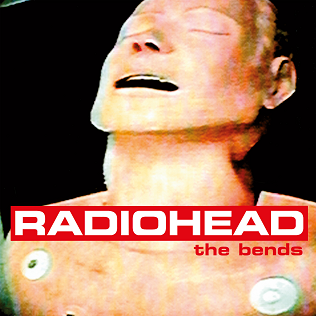
The Bends is the second studio album by the English rock band Radiohead, released on 13 March 1995 by Parlophone. It was produced by John Leckie, with extra production by Radiohead, Nigel Godrich and Jim Warren. The Bends combines guitar songs and ballads, with more restrained arrangements and cryptic lyrics than Radiohead's debut album, Pablo Honey (1993).
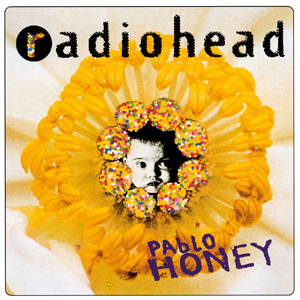
Pablo Honey is the debut studio album by the English rock band Radiohead, released on 22 February 1993 in the UK by Parlophone and on 20 April in the US by Capitol Records. It was produced by Sean Slade, Paul Q. Kolderie and Radiohead's co-manager Chris Hufford.

Hail to the Thief is the sixth studio album by the English rock band Radiohead. It was released on 9 June 2003 through Parlophone internationally and a day later through Capitol Records in the United States. It was the last album released under Radiohead's record contract with EMI, the parent company of Parlophone and Capitol.

Edward John O'Brien is an English guitarist, songwriter and member of the rock band Radiohead. He releases solo music under the name EOB.

Philip James Selway is an English musician and the drummer of the English rock band Radiohead. He was inducted into the Rock and Roll Hall of Fame as a member of Radiohead in 2019.

Travis are a Scottish rock band formed in Glasgow in 1990, composed of Fran Healy, Dougie Payne, Andy Dunlop and Neil Primrose. The band's name comes from the character Travis Henderson from the film Paris, Texas (1984).

"Paranoid Android" is a song by English alternative rock band Radiohead, released as the lead single from their third studio album OK Computer (1997) on 26 May 1997. The lyrics were written by singer Thom Yorke following an unpleasant experience in a Los Angeles bar. The song is over six minutes long and contains four sections. The name is taken from Marvin the Paranoid Android from the science fiction series The Hitchhiker's Guide to the Galaxy.
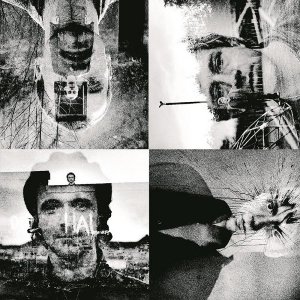
12 Memories is the fourth studio album from Scottish alternative rock band Travis. The album was released on 11 October 2003 on Epic Records. In comparison, the album is a much more mature and lyrically darker album, focusing on issues such as the 2003 Iraq invasion, politicians, psychological crisis and domestic abuse.

"Knives Out" is a song by the English rock band Radiohead, released as the second single from their fifth album, Amnesiac (2001). It features lyrics about cannibalism and guitars influenced by the Smiths. "Knives Out" received positive reviews and reached number 13 on the UK Singles Chart and number one on the Canadian Singles Chart. The music video was directed by Michel Gondry.
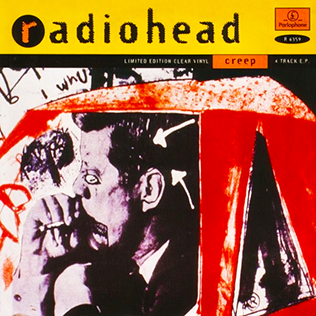
"Creep" is the debut single by the English rock band Radiohead, released on 21 September 1992. It appeared on their debut studio album, Pablo Honey (1993). Radiohead took elements from the 1972 song "The Air That I Breathe"; following legal action, Albert Hammond and Mike Hazlewood are credited as cowriters.

"Fake Plastic Trees" is a song by the English rock band Radiohead, released on their second album, The Bends (1995). It was the third single from The Bends in the UK, and the first in the US. It reached the top 50 on the UK Singles Chart, the New Zealand Singles Chart, the US Modern Rock Tracks chart and the Canadian Rock/Alternative chart.
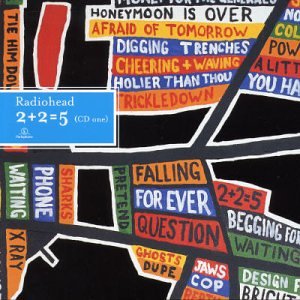
"2 + 2 = 5" is a song by the English rock band Radiohead. It is the opening track to their sixth studio album Hail to the Thief (2003), and was also released as the album's third and final single. It reached number two on the Canadian Singles Chart, number 12 on the Italian Singles Chart, and number 15 on the UK Singles Chart. It was included in Radiohead: The Best Of (2008).
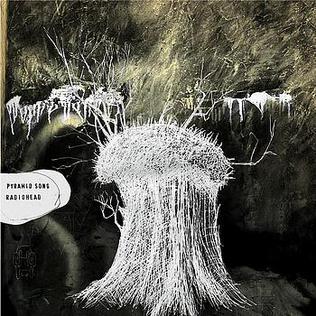
"Pyramid Song" is a song by the English rock band Radiohead, released as the lead single from their fifth studio album, Amnesiac (2001). It features piano, strings, an unusual "shuffling" rhythm and lyrics inspired by the Egyptian underworld.

"Sing" is a song by Scottish rock band Travis from their third studio album, The Invisible Band (2001). The song was written in 1999 by frontman Fran Healy, produced by Nigel Godrich and recorded at Ocean Way Studios in Los Angeles. It was released as the album's lead single in the United States on 23 April 2001. Healy originally titled the melody "Swing" but eventually changed the title to "Sing", making it about working past the troubles of a relationship by not being afraid to let oneself go and sing in front of a loved one. The song is noted for its prominent use of the banjo, played by lead guitarist Andy Dunlop, and contains a string arrangement performed by Millennia Strings.

"Re-Offender" is a song by Scottish alternative rock band Travis, released as the first single from their fourth studio album, 12 Memories. It was released as a single in the UK on 29 September 2003 and peaked at number seven on the UK Singles Chart. The song featured in two episodes of One Tree Hill and is included in the compilation album One Tree Hill – Music from the WB Television Series, Vol. 1.

"Just" is a song by the English rock band Radiohead, included on their second album, The Bends (1995). It was released as a single on 21 August 1995 and reached number 19 on the UK Singles Chart. In 2007, NME named "Just" 34th on its list of the "Greatest Indie Anthems Ever". In 2008, it was included in Radiohead: The Best Of. The English producer Mark Ronson released a cover version in February 2008 as the fourth single from his album Version.
"I Promise" is a song by the English rock band Radiohead, released in 2017. Radiohead performed it on their 1996 tour, and recorded it during the sessions for their third album, OK Computer (1997), but felt it was not strong enough to release. In June 2017, "I Promise" was included on the OK Computer reissue OKNOTOK 1997 2017 and released as a download with a music video.
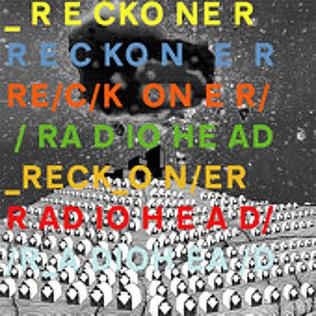
"Reckoner" is a song by the English rock band Radiohead, released on their seventh album, In Rainbows (2007). It was produced by Nigel Godrich and developed while Radiohead were working on another song, "Feeling Pulled Apart by Horses".


















